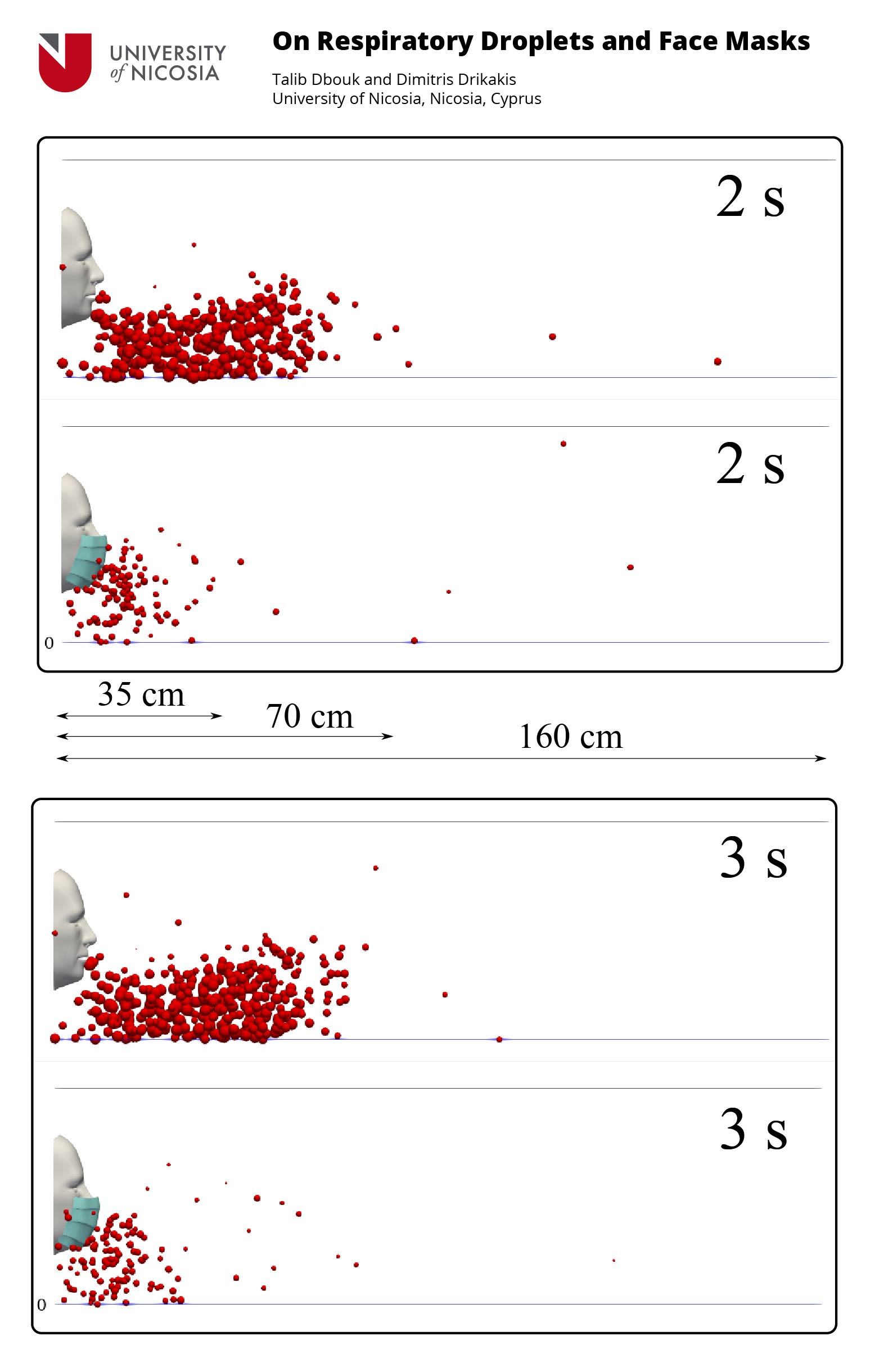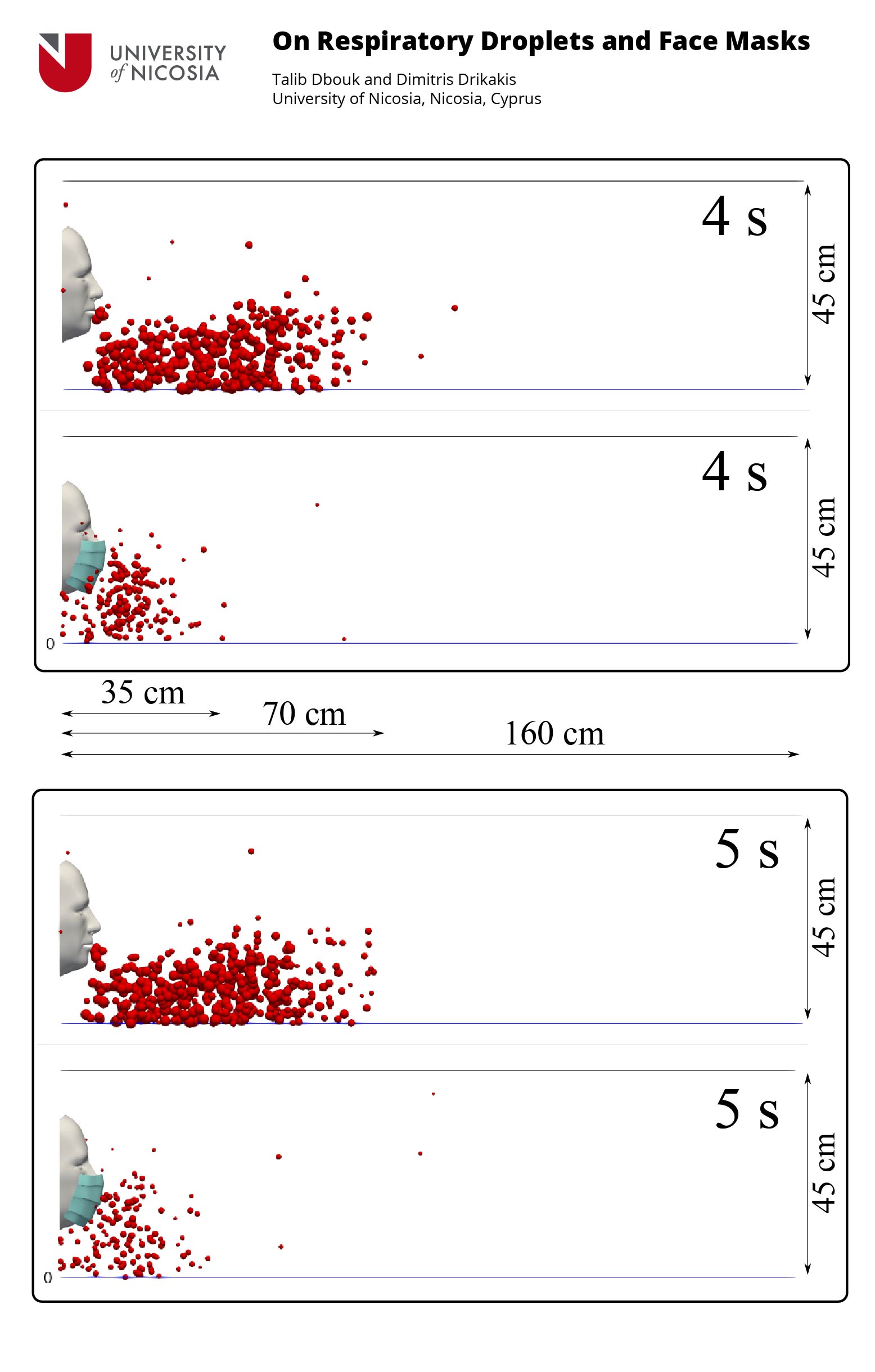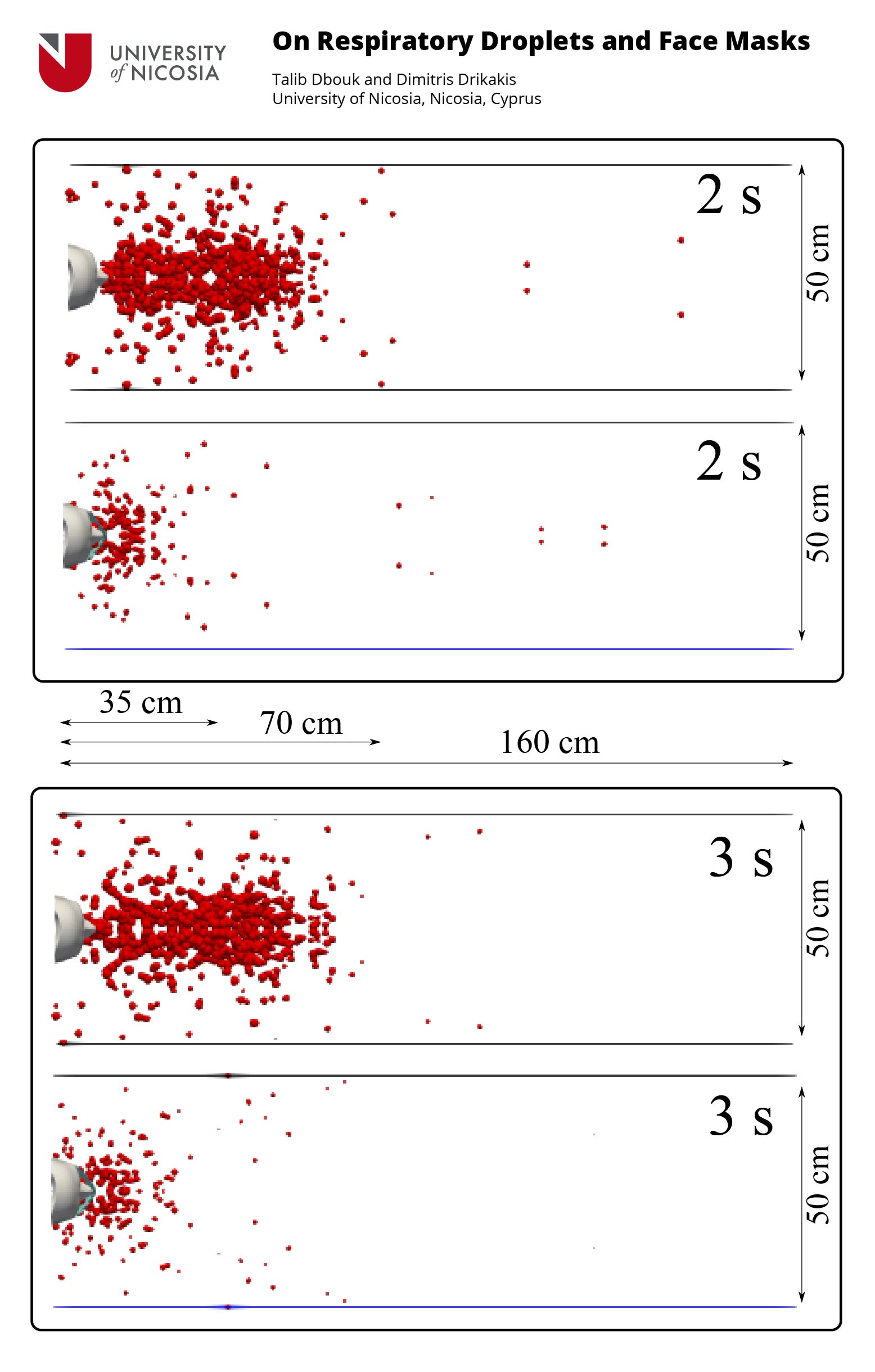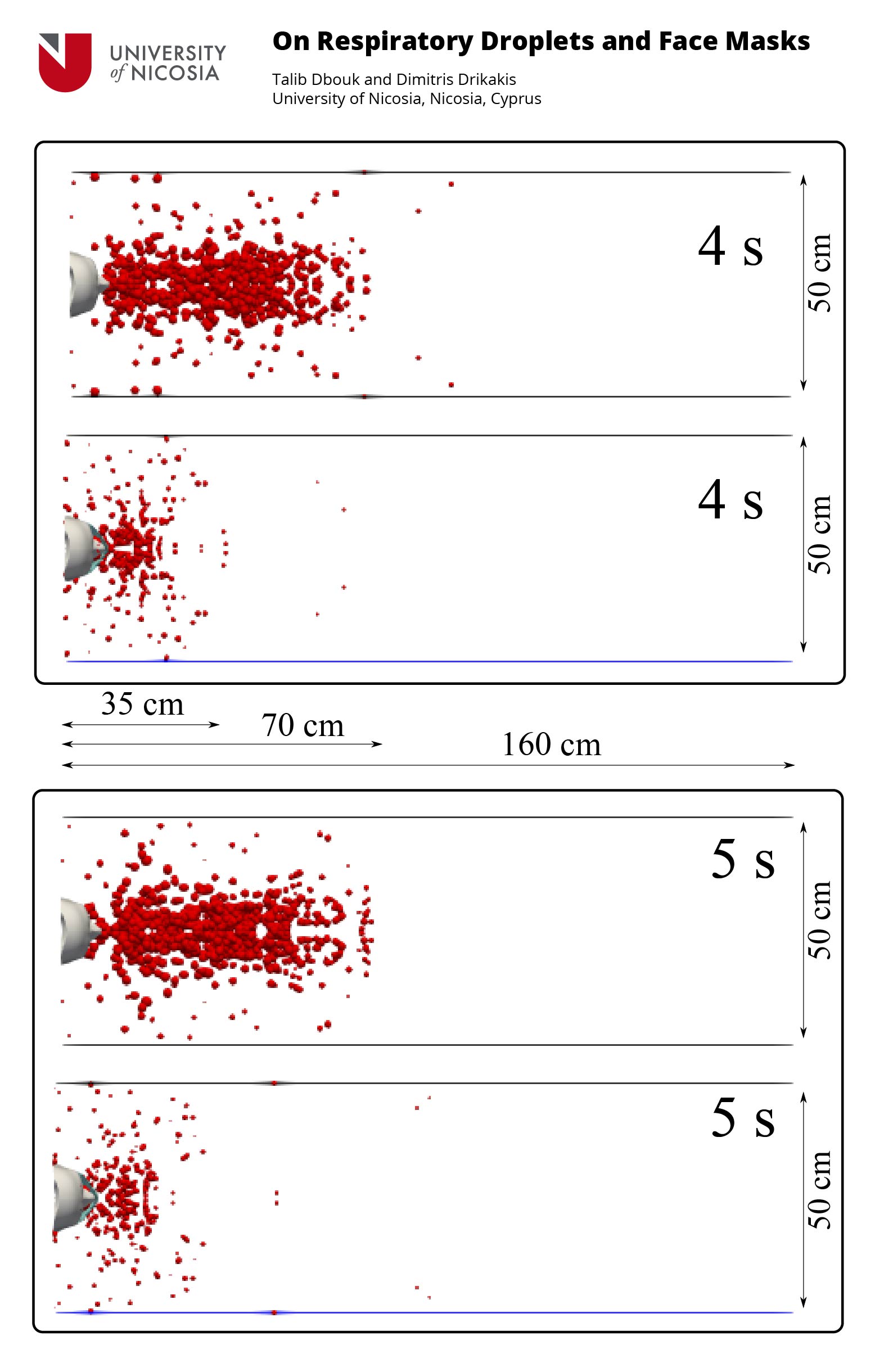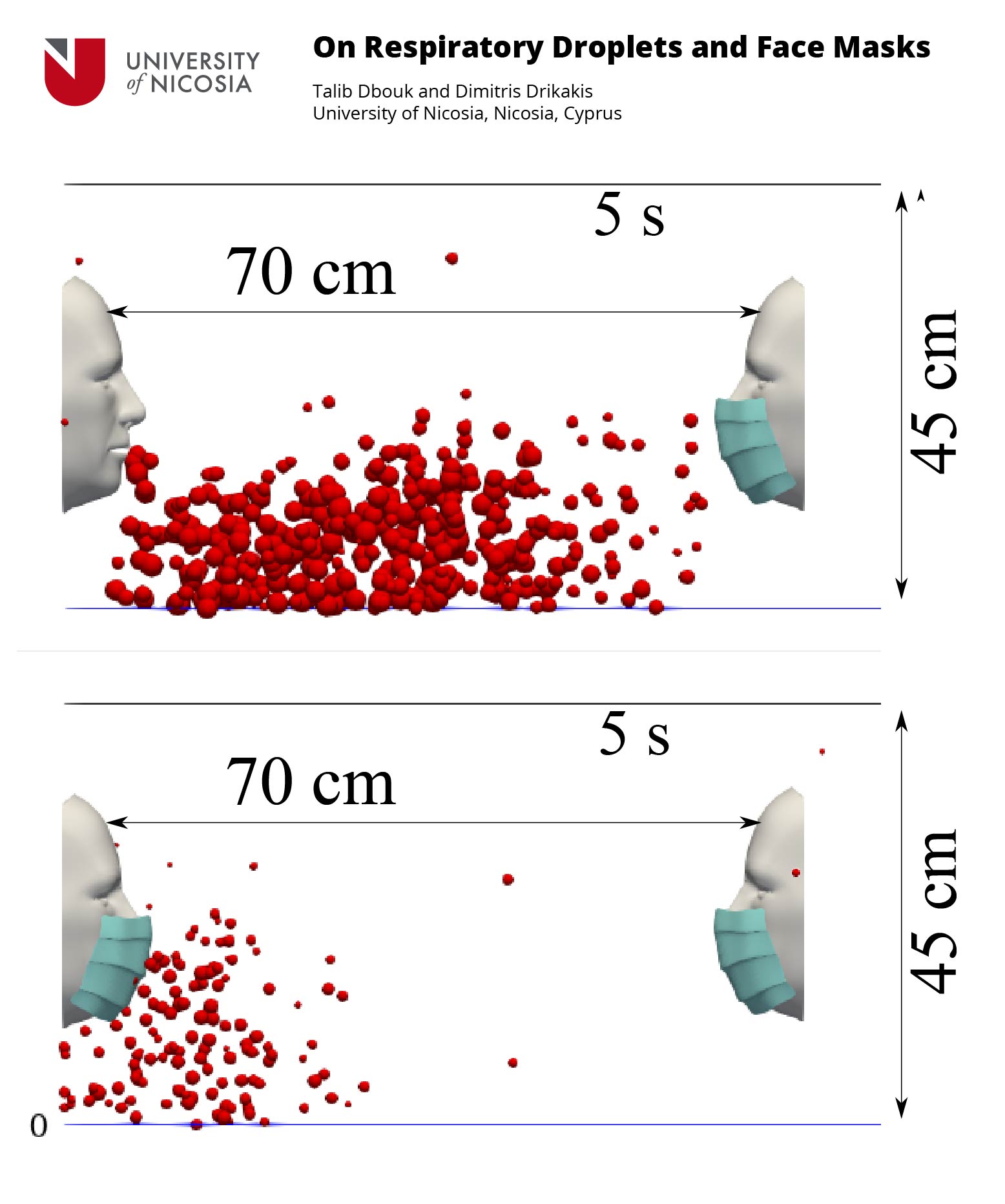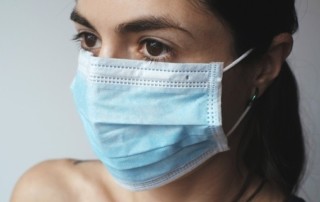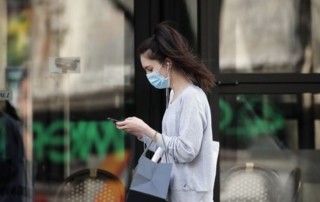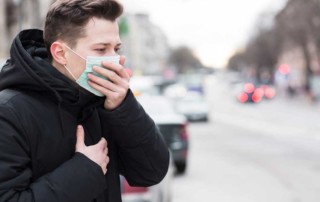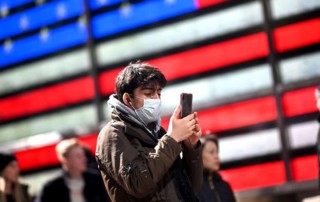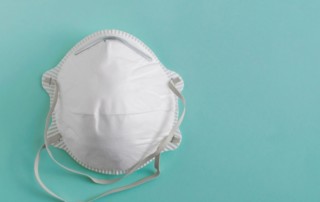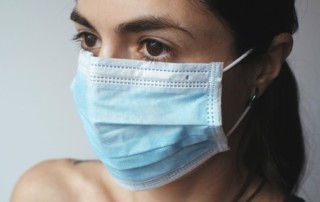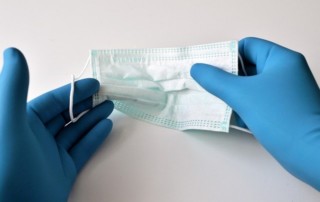COVID-19
UNIC Coronavirus Health and Research Portal
On Respiratory Droplets and Face Masks
Talib Dbouk and Dimitris Drikakis
University of Nicosia, Nicosia, Cyprus
Face mask filters – textile, surgical or respiratory – are widely used in the effort to limit the spread of airborne viral infections. Our understanding of the droplet dynamics around a face mask filter, including the droplet containment, leakage from and passing through the cover, is incomplete.
The authors present a fluid dynamics study of the transmission of respiratory droplets through and around a face mask filter. By employing multiphase computational fluid dynamics Dbouk & Drikakis investigate the droplet dynamics induced by a mild coughing incident and examine the fluid dynamics phenomena affecting the mask efficiency. The model takes into account turbulent dispersion forces, droplet phase-change, evaporation, and breakup in addition to the droplet–droplet and droplet–air interactions. The model mimics real events by using data which closely resemble cough experiments.
The study shows that the criteria employed for assessing the face mask performance must be modified to take into account: the penetration dynamics of airborne droplet transmission, the fluid dynamics leakage around the filter, and reduction of efficiency during cough cycles. A new criterion for calculating more accurately the mask efficiency by taking into account the penetration dynamics, is proposed.
We show that the use of masks will reduce the airborne droplet transmission and will also protect the wearer from the droplets expelled from other subjects. However, many droplets still spread around and away from the cover, cumulatively, during cough cycles. Therefore, the use of a mask does not provide complete protection, and social distancing remains important during a pandemic. The implications of the reduced mask efficiency and respiratory droplet transmission away from the mask are even more critical for healthcare workers. The results of this study provide evidence of droplet transmission prevention by face masks, which can guide their use and further improvement.
Figure 1
A subject coughing in a cyclic incidence. A qualitative examination of airborne droplet transmission with and without wearing a surgical mask. The top and bottom figures show the results at 2 s and 3 s, respectively. Wearing a surgical mask that exhibits an initial efficiency of ∼91%. This cannot prevent the transport of the saliva droplets away from the subject. Many droplets penetrate the mask shield and some saliva droplet disease-carrier particles can travel more than 1.2 m. For visualization, the droplets were scaled by a factor of 600 compared to their actual size. The environmental conditions are zero wind speed, ambient temperature 20 ○C, pressure 1 atm, and relative humidity 50%. The mouth temperature is 34 ○C and the face skin temperature is 32 ○C.
Figure 2
A subject coughing in a cyclic incidence. A qualitative examination of airborne droplet transmission with and without wearing a surgical mask. The top and bottom figures show the results at 4 s and 5 s, respectively. Wearing a surgical mask that exhibits initial efficiency of ∼91%. This cannot prevent the transport of the saliva droplets away from the subject. Many droplets penetrate the mask shield and some saliva droplet disease-carrier particles can travel more than 1.2 m. For visualization, the droplets were scaled by a factor of 600 compared to their actual size. The environmental conditions are zero wind speed, ambient temperature 20 ○C, pressure 1 atm, and relative humidity 50%. The mouth temperature is 34 ○C, and the face skin temperature is 32 ○ C.
Figure 3
A subject coughing in a cyclic incidence. Top view of a qualitative examination of airborne droplet transmission with and without wearing a surgical mask. The top and bottom figures show the results at 2 s and 3 s, respectively. We consider a surgical mask that exhibits initial efficiency of ∼91%. The cover does not prevent the transport of the saliva droplets entirely away from the subject. Many droplets penetrate the mask shield, and some saliva droplet disease-carrier particles can travel more than 1.2 m. For visualization, the droplets were scaled by a factor of 600 compared to their actual size. The environmental conditions are zero wind speed, ambient temperature 20 ○C, pressure 1 atm, and relative humidity 50%. The mouth temperature is 34 ○C, and the face skin temperature is 32 ○C.
Figure 4
A subject coughing in a cyclic incidence. Top view of airborne droplet transmission with and without wearing a surgical mask. The top and bottom figures show the results at 4 s and 5 s, respectively. We consider a surgical mask that exhibits an initial efficiency of ∼91%. The cover does not prevent the transport of the saliva droplets entirely away from the subject. Many droplets penetrate the mask shield and some saliva droplet disease-carrier particles can travel more than 1.2 m. For visualization, the droplets were scaled by a factor of 600 compared to their actual size. The environmental conditions are zero wind speed, ambient temperature 20 ○C, pressure 1 atm, and relative humidity 50%. The mouth temperature is 34 ○C, and the face skin temperature is 32 ○C.
Figure 5
Mask wearer: subjects wearing a mask will reduce the respiratory droplet transmission while (partially) shielding themselves from other subjects experiencing a coughing incident. We show the results at 5 s simulation time for a surgical mask exhibiting an initial efficiency of ∼91%. The environmental conditions are zero wind speed, ambient temperature 20 ○C, pressure 1 atm, and relative humidity 50%. The mouth temperature is 34 ○C and the face skin temperature is 32 ○C.
What Does This Mean?
According to the results of this study, the authors made recommendations that are summarised below:
- Although masks will reduce the droplet transmission, we should not ignore that several droplets will be transmitted away from the mask. The use of a mask will not provide complete prevention from airborne droplet transmission. The above is particularly important, both for indoor and outdoor environments. As Dbouk and Drikakis showed in a previous study (https://aip.scitation.org/doi/10.1063/5.0011960) respiratory droplets can be transmitted to several meters away from the subject due to wind conditions. Therefore, social distancing remains essential when facing an evolving pandemic.
- The above recommendation implies that we can protect healthcare workers only if we equip them with a complete PPE, e.g., completely a helmet with a built-in air filter, a face shield together with a disposable suit over the whole ensemble and a double set of gloves.
- The manufacturers and regulatory authorities should consider new criteria for assessing mask performance, to account for the flow physics and cough dynamics. The authors provided a simple criterion that takes into account the efficiency reduction during a cyclic coughing incident.
Video 1
A subject coughing in a cyclic incidence. A qualitative examination of airborne droplet transmission with and without wearing a surgical mask.
The University of Nicosia (UNIC)
About the University of Nicosia
The University of Nicosia (UNIC) is the largest university in Cyprus, and the largest university in southern Europe that teaches primarily in English, welcoming 12,000+ students from over 70 countries worldwide. The University of Nicosia is a comprehensive university with 6 schools, 20 departments and over 100 degree programs offered on-campus and online.
The University of Nicosia is best known in the fields of medicine, law, blockchain, accounting, education, forecasting and international relations and for a series of partnerships with other leading European universities. UNIC was most recently ranked #106 in its region by QS and #300 to #400 globally in the Times Higher Education Impact rankings.
To learn more about the University of Nicosia, please see: https://www.unic.ac.cy/
UNIC’s COVID-19 Response
University of Nicosia faculty across a variety of academic disciplines are actively engaged in research and analysis and serving in scientific / public policy roles supporting the global COVID-19 response.
For more information about the University of Nicosia’s work relating to COVID-19 including potential collaboration, please see: https://www.unic.ac.cy/coronavirus/
Contact Information
For more information about this study, please contact Prof Dimitris Drikakis at drikakis.d@unic.ac.cy.
For more information on our COVID-19 related research in general, please contact UNIC at covid19@unic.ac.cy.
Press Coverage
Articles and press mentions in global media about the research.
COVID-19: Coughing makes face masks ineffective | TheHealthSite.com
COVID-19: Coughing makes face masks ineffective | TheHealthSite.com The COVID-19 pandemic is here to stay for some time to come. With no cure or vaccination in sight, it is imperative that you take the proper precautions and say safe. Frequent washing of hands, social distancing and wearing a face mask is now mandatory. Now researchers say that if you cough repeatedly, your face mask may just become ineffective and allow virus ridden particles to escape and infect others. Also Read [...]
Toilets could be flush with coronavirus, masks struggle to contain repeated coughs – Physics World
Toilets could be flush with coronavirus, masks struggle to contain repeated coughs – Physics World Here is another very good reason to wash your hands after using the facilities – and you might also want to wear a mask. Yun-Yun Li, Ji-Xiang Wang and Xi Chen of Southeast University in Nanjing, China have published a paper called “Can a toilet promote virus transmission? From a fluid dynamics perspective”. The answer, at least according to their computer simulation, is an emphatic [...]
Nova simulação: é assim que o coronavírus se espalha, mesmo com uso de máscara – Canaltech
Nova simulação: é assim que o coronavírus se espalha, mesmo com uso de máscara - Canaltech Buscando controlar infecções do novo coronavírus (SARS-CoV-2), o uso de máscaras de proteção é recomendado por autoridades da saúde e é até mesmo obrigatório em muitas situações, como no transporte público. A questão é se elas são, realmente, efetivas na proteção de pessoas contra a COVID-19. De acordo com uma simulação feita por pesquisadores da Universidade de Nicósia, no Chipre, não. O uso do equipamento de [...]
Tosse repetitiva pode diminuir eficácia da máscara, alerta estudo
O uso da máscara facial de tecido é essencial para evitar a propagação e infecção pelo novo coronavírus. No entanto, segundo estudo da Universidade de Nicósia, no Chipre, tossir muito ao usá-la pode acabar desgastando seu material, tornando-a menos eficiente. O artigo foi publicado na terça-feira (16), na revista Physics of Fluids. Os pesquisadores usaram computadores para mapear os padrões esperados de fluxo de pequenas gotículas liberadas quando uma pessoa tosse repetidamente ao usar máscara. Como foi constatado em pesquisas anteriores, quando uma pessoa tosse, [...]
Προστατευτικές μάσκες: Τα δύο σημαντικά ευρήματα έρευνας για τη χρήση τους
Δύο σημαντικά ευρήματα ήρθαν στο φως της δημοσιότητας από επιστημονικής έρευνα που είχε ως επίκεντρο τη χρήση προστατευτικής μάσκας.Ο Καθηγητής της Ιατρικής Σχολής του Πανεπιστήμιού Λευκωσίας, Δρ Δημήτρης Δρικάκης, σε παρέμβαση του στην εκπομπή του ΑΝΤ1 «Μέρα Μεσημέρι», υπογράμμισε ότι οι απλές χειρουργικές μάσκες είναι προστατευτικές αλλά όχι όσο νομίζουμε. Συγκεκριμένα, εξήγησε ότι το πρώτο εύρημα της εν λόγω έρευνας έχει να κάνει με το γεγονός ότι ακόμα και με τη χρήση μάσκας, κάποια σταγονίδια του σιέλου μπορούν να ταξιδέψουν [...]
Filtering capacity of face masks “adversely affected” by repeated coughing, study says
Filtering capacity of face masks "adversely affected" by repeated coughing, study says London: While facial masks reduce the spread of COVID-19, their filtering efficiency is adversely affected by repeated coughing, according to a new study which recommends complete personal protective equipment for healthcare workers including helmets with built-in air filters, and face shields. Scientists, including Talib Dbouk and Dimitris Drikakis from the University of Nicosia in Cyprus, used computer models to map out the expected flow patterns of small droplets [...]
Estudio afirma que el Covid-19 puede transmitirse entre personas estén a un metro de distancia aunque usen cubrebocas » Intriper.
Si has estado sentado en tu casa desde marzo comiendo nada más que queso y esperando que se abran los bares, involuntariamente has estado entrenando para este trabajo soñado. Whisps, una compañía de papas fritas, está buscando a alguien que se una al Whisps Cheese Board. A la persona elegida se le pagarán 5,000 dólares en efectivo y ventajas por comer queso durante un año. El 25 de julio Whisps seleccionará a un amante del queso para unirse a la [...]
Study says if you do this with your mask on, the protection rate drops dramatically
Study says if you do this with your mask on, the protection rate drops dramatically Most reasoned analysis elects face masks as our most effective countermeasure against the COVID-19 pandemic. Of course, there are a lot of variables to consider as far as the application is concerned. We know that our transmission risk either decreases or increases considerably depending on the material our mask is made out of, but what about the influence our behavior poses while wearing one? Thankfully, [...]
Tosse repetitiva pode diminuir eficácia da máscara, alerta estudo – Revista Galileu | Ciência
Tosse repetitiva pode diminuir eficácia da máscara, alerta estudo Com tosse constante, gotículas podem se acumular no tecido e escapar, atingindo até um metro de distância. Sem a máscara, o alcance dobra. Proteção deve ser trocada a cada duas horas O uso da máscara facial de tecido é essencial para evitar a propagação e infecção pelo novo coronavírus. No entanto, segundo estudo da Universidade de Nicósia, no Chipre, tossir muito ao usá-la pode acabar desgastando seu material, tornando-a menos eficiente. [...]
Face masks: Small droplets of saliva can emerge with some droplets traveling up to 1 meter: Study
Face masks: Small droplets of saliva can emerge with some droplets traveling up to 1 meter: Study Face masks are thought to slow the spread of viruses, including the novel coronavirus that causes COVID-19, but little is known about how well they work. In an issue of Physics of Fluids, by AIP Publishing, Talib Dbouk and Dimitris Drikakis, from the University of Nicosia in Cyprus, use precise computer models to map out the expected flow patterns of small droplets released when [...]
